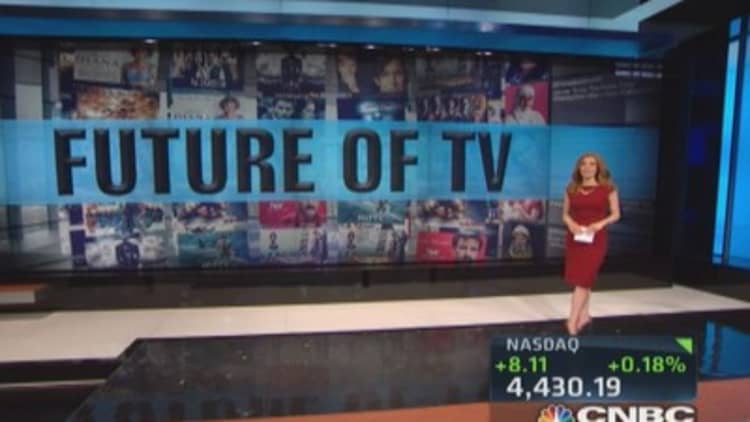
Even in a world of self-driving cars where people download movies to wristwatches, most television of the future will still reach homes through cable lines that are already in the ground, media executives predict.
"People are still going to live in houses and work in buildings in 25 years," said Mike Fries, CEO of Liberty Global, an operator of cable systems across Europe. "They're probably going to be best served if content comes through a big pipe."
Large cable companies have spent tens of billions of dollars acquiring rival companies in recent years—along with an equally impressive amount bulking up existing underground infrastructure. Liberty Global bought U.K. cable-TV and Internet provider Virgin Media last year for $17 billion and CNBC parent Comcast is awaiting regulatory approval to purchase Time Warner Cable for $45 billion.
At the same time, more robust mobile networks have allowed consumers to stream video onto mobile devices such as tablets and phones that can be taken anywhere. Some 82 million people in the U.S. watched TV or video on a mobile phone at least once in the month of August, a 23 percent increase from a year earlier, according to comScore.
Read MoreCan billionaires save the American newspaper?
In defense of cable's long-term viability, Fries pointed out that most of the demand for wire-free video can be satisfied with Wi-Fi networks. Those "networks will become more robust and ubiquitous," he said.
Fries pointed out that even towers submitting wireless signals to phones are connected to underground networks. The amount of data required for high-quality video will probably be more than wireless spectrum can handle, he said.
Analysts agree that it would be difficult for wireless networks to match broadband. "The economics of wireless make it very hard to envision a day when the traffic that currently rides over wired broadband can be shifted to wireless," said Craig Moffett, an analyst at MoffettNathanson.
Read More Ads in the future will get IN your face
"If anything, Wi-Fi, which from an economic perspective is a wired service, is encroaching on wireless much faster than wireless is encroaching on wired," Moffett said. "The bandwidth demands on wired networks are gapping away from what wireless can offer."
Comcast Cable CEO Neil Smit envisions a world where video is available absolutely everywhere. "You'll never have to wait to watch whatever you want on any screen ... whether that's your TV, phone, fridge, wall, dashboard or mirror," he said.
There are also big implications for the advertising world. Currently, marketers rely on somewhat antiquated ratings from Nielsen that offer only limited information about an audience. But as it becomes easier to track profiles of viewers, advertising will become more targeted.
"New business models for paid content will emerge and addressable advertising capabilities will proliferate," Smit said.
Read More 11 Predictions on the future of social media
The idea of a TV schedule could also fade away as people watch exactly what they want, when they want. "The future of video will be infinitely more on-demand and the customer will be king," Smit said. "Customers will be able to watch and move that content between devices in and out of the home."
One factor that could preserve the grid to some degree is the popularity of live sports.
"Certain programs like live sports, news, big events will stay in linear form forever," said Michael Nathanson, an analyst at MoffettNathanson. "The hourly grid will last because of the live elements of TV but everything else could go [video on demand] in the long run."
Some things about TV may never change. Speaking at a conference in 2012, CBS CEO Leslie Moonves pointed out that the network still earned $20 million in annual revenue from episodes of "I Love Lucy," which shot its final episode in 1957.
"Fifty years years from now there is going to be some other idiot sitting here saying 'I am selling CSI, a show that was shot in 2012,'" he said. "And that is going to happen."




